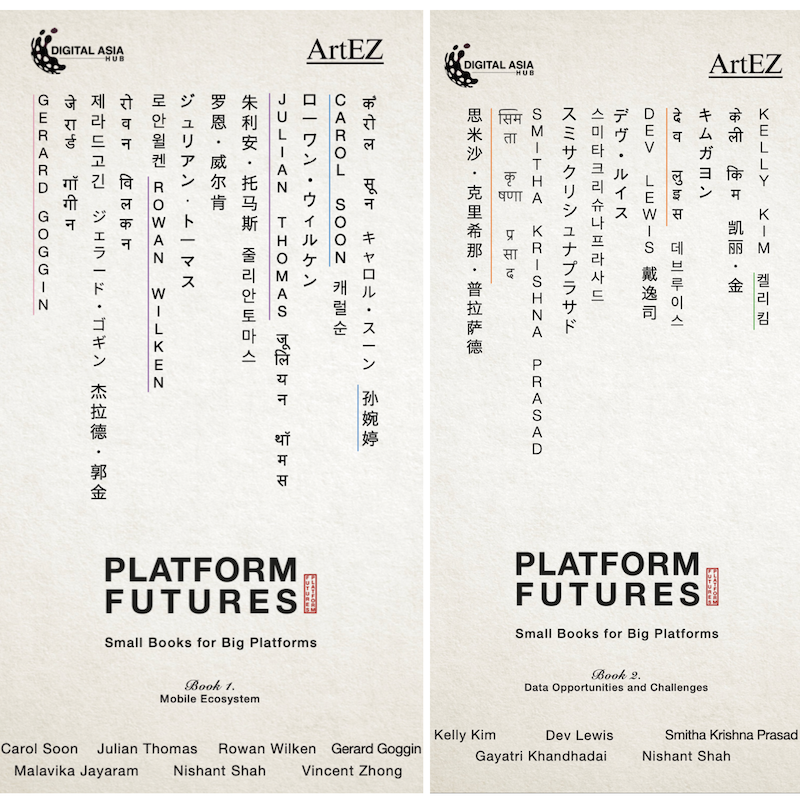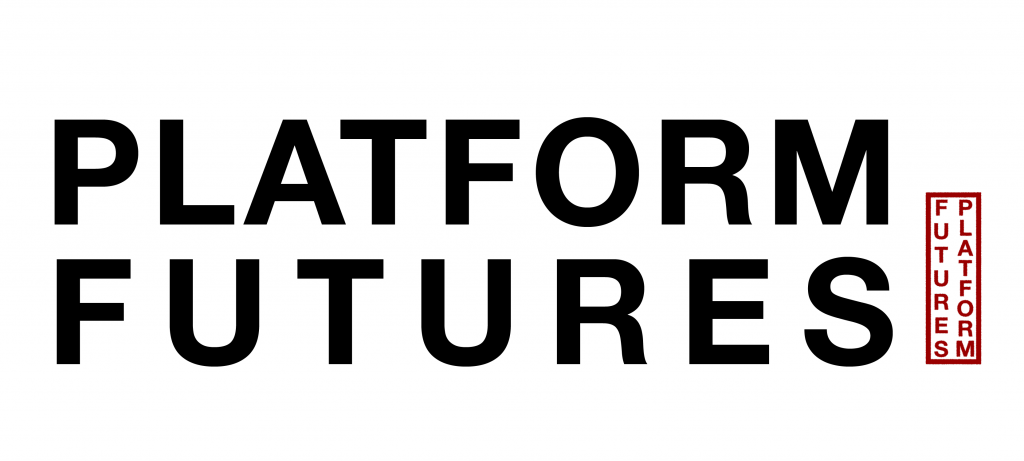
The ‘Small Books for Big Platforms’ series, part of the Digital Asia Hub’s programme on Platform Futures, is a comparative cross-area study that explores the opportunities and challenges of data ecosystems and platform ecologies in the Asia-Pacific region. It invites scholars studying the policies, regulations, implementation, digital cultures, and usage of emerging and existing platform structures in the region to provide a critical insight into the multiplicity, potentials, and ramifications of platform societies.
The ‘platform’ in these books is not a monolith: it encompasses a multiplicity of practices, histories and cultures in different parts of the world. Both books revolve around the idea of frictions, particularly when it comes to understanding the emergence, affordances, and governance of platforms.
The ‘small books’ are meant to be sharp, critical, located studies that help map the field as well as develop an inventory of questions that emerge from the localisation of platforms and the regional geopolitical landscape within which they operate. The books simultaneously want to foreground the specificity and difference in emerging platform societies, thus demanding for granularised and located understanding of platformisation, as well as the larger shared concerns and connections that help strengthen the continued conversations around competition, in- novation, safety, security, privacy, transparency, and distribution of data and algorithm-driven practices on digital platforms.
Meanwhile, the series is also meant to be provocations that help understand the emerging policy issues, the discourse in different regions, and the opportunities and threats of platform futures in the Asia Pacific region. It is particularly keen on provoking discussions around the ‘frictions’ of platforms, which do not necessarily follow the discourse of a largely North-West centred theoretical and cultural orientation. We use ‘frictions’ as a space of provocation because it doesn’t offer easy polarisations or binaries, but instead looks at the process through which the platformed societies operate and work, and the spaces where they ‘don’t quite sit well’. ‘Frictions’ could be enablers or barriers, causes or symptoms, or points of tension that highlight pre-existing contestations or histories. Instead of platforms as blackboxes, we approach them as ‘spaces in the making’, and are interested in mapping the different actors, stakeholders, communities, and users who make the platforms and create conditions for their emergence and adoption.
The first two ‘small books’ are a starting point of this series. Each ‘small book’ has a defined theme that focuses on Mobile Ecosystems and Data Opportunities and Challenges. Given the fluidity of these focus areas, the tensions and the local urgencies of these emerging fields, it was necessary for us to conceive of these ‘small books’ as collaborative, community- driven projects which centre the scholarship of renowned scholars and practitioners rooted in multi-discplinary and multi-sectoral engagements. It is important for us to emphasise that while the scholarship in this book is developed by the authors giving us meaningful and nuanced contributions, it is bolstered by a larger community of peer-reviewers, who have engaged with this work and added to it through a distributed open-review process, participation in workshops, and conversations and dialogues that go beyond the scope of these books. We would like to express particular appreciation to the following peer-reviewers:
- Chinmayi Arun, Resident Fellow, Information Society Project, Yale Law School
- Nighat Dad, Executive Director, Digital Rights Foundation
- Bishakha Datta, Executive Director, Point of View, India
- Kingwa Fu, Associate Professor at the Journalism and Media Studies Centre of The University of Hong Kong
- Helani Galpaya, CEO, LIRNEasia
- Yong Lim, Co-Director, AI Policy Initiative, Seoul National University
- Siddharth Narrain, Phd Candidate, School of Global and Public Law, Faculty of Law and Justice, University of New South Wales
- Julian Thomas, Director of the ARC Centre of Excellence for Automated Decision-Making and Society, and a Distinguished Professor in the School of Media and Communication, RMIT University
Small Book 1 – Mobile Ecosystems
In this ‘small book’, around the theme ‘Mobile Ecosystem’, Carol Soon, Gerard Goggin, and Julian Thomas and Rowan Wilken contribute key written inputs that pay particular attention to hyper-personalisation of falsehoods propagation and intervention with a case study of Singapore, platform futures in Asian post-mobile societies with a case study of Japan, and geographical information platform with a case study of Google Earth (Australia). Each contribution provides a synthesis of the state of discourse in the field, landmark policies, judgements, regulations, practices, and cases that shape this discourse, a detailed analysis of the challenges and opportunities presented, and further considerations and recommendations on interventions that are needed to build more equitable, resilient, and inclusive futures of platformisation. What’s more, one synthesis piece, developed by Nishant Shah and Malavika Jayaram, is included and provides a bird’s eye view of the emerging knowledge with- in this theme. With its multi-area focus and Inter-Asia-Pacific framework, we hope that these small books become a vehicle for asking big questions about platforms that our futures are being hosted on.
- Beyond the Device: Urgency and Emergencies in a Mobile Ecosystem Malavika Jayaram & Nishant Shah
- Hyper-personalisation of Falsehood Propagation and Intervention – Carol Soon
- Google Earth: A platform for the planetary Geoweb – Julian Thomas & Rowen Wilken
- Platform Futures in Asian Post-Mobile Societies: The Case of Japan’s SoftBank – Gerrard Goggin
Small Book 2 – Data Opportunities and Challenges
In this ‘small book’, around the theme ‘Data Opportunities and Challenges’, Smitha Krishna Prasad, Kelly Kim, and Dev Lew- is contributes key written inputs that pay particular attention to Covid-19 and public health platforms in India, data opportunities and challenges in South Korea, and Taiwan model for civic-tech platforms in the Covid-19 pandemic. Each contribution provides a synthesis of the state of discourse in the field, land- mark policies, judgements, regulations, practices, and cases that shape this discourse, a detailed analysis of the challenges and opportunities presented, and further considerations and recommendations on interventions that are needed to build more equitable, resilient, and inclusive futures of platformisation. What’s more, one synthesis piece, developed by Gayatri Khandhadai, is included and provides a bird’s eye view of the emerging knowledge within this theme. With its multi-area focus and Inter-Asia-Pacific framework, we hope that these small books become a vehicle of asking big questions about platforms that our futures are being hosted on.
- Understanding Data Opportunities and Challenges through Experiences – Gayatri Khandhadai
- Recent Debates on Data Utilisation and Protection: 3 Data Laws and Lee Luda – Kelly Kim (EN/KOR)
- Taiwan’s Covid Response – Dev Lewis
- Covid-19 and Public Health Platforms in India – Smitha Krishna Prasad
2021- Creative Commons Attribute – Non Commercial – Share Alike 4.0 Netherlands License.
You are free to reuse, distribute, remix, adapt, and build upon the material in any medium or format for noncommercial purposes, only, and only so long as attribution is given to the creator, and that the subsequent works carry the same identical licensing conditions.
Published 2021 by the Digital Asia Hub and the Professorship Aesthetics and Cultures of Technology at ArtEZ University of the Arts.
Series Editors: Nishant Shah, Malavika Jayaram, and Vincent Zhong
Volume Contributors: Kelly Kim, Dev Lewis, Smitha Krishna Prasad, Gayatri Khandhadai, Nishant Shah, Carol Soon, Julian Thomas, Rowan Wilken, Gerard Goggin, Malavika Jayaram, and Vincent Zhong
Primary Knowledge Partner: Nishant Shah
Copyeditor and proofreader: Shruthi Menon
Cover and Design: Angie Kang
Through a new program on Platform Futures, the Digital Asia Hub convenes a network of academics and experts studying multiple aspects of platforms, and to create a space for dialogue on opportunities, challenges, and governance best practices in the APAC context.

